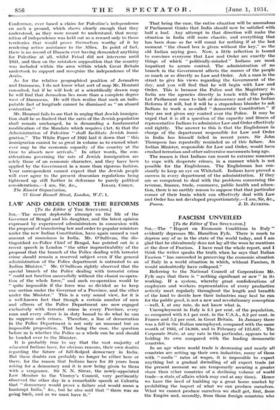LAW AND ORDER UNDER THE REFORMS [To the Editor of
THE SPECTATOR.] Sin,—The recent deplorable attempt on the life of the Governor of Bengal and his daughter, and the latest opinion expressed by experienced administrators in connexion with the proposal of transferring law and order to popular ministers under the new Indian Constitution, have again caused a vast amount of uneasiness in India. Mr. O'Sullivan, the dis- tinguished ex-Police Chief of Bengal, has pointed out in a recent speech in London " the utter impracticability of the proposal that the branch of the Police dealing with terrorist crime should remain a reserved subject even if the general administration of the Police department is entrusted to an Indian Minister." Mr. O'Sullivan rightly observed that the special branch of the. Police dealing with terrorist crime " could not function successfully without the closest co-opera- tion of the whole force," and such co-operation would be quite impossible if the force was so divided as to keep one section under the Governor of a Province, and the other under the Minister." This is a very sound view, for it is a well-known fact that though a certain number of men and officers of the Police Department are now engaged exclusively with terrorist crime in every Province, every man and every officer is in duty bound to do what he can to suppress such crimes. Therefore, a line of demarcation in the Police Department is not only an unsound but an impossible proposition. That being the case, the question before us is whether the Police as a whole can be and should be handed over to the Minister.
It is probably true to say that the vast majority of educated Indians have, for obvious reasons, their own doubts regarding the future of full-fledged democracy in India. But these doubts can probably no longer be either here or there, for the reason that Indians have for 50 years been asking for a democracy and it is now being given to, them with a vengeance. Sir N. N. Sircar, the newly-appointed Law Member to the Viceroy's Council, very pertinently observed the other day in a remarkable speech at Calcutta that " democracy would prove a failure and would mean a bankrupt India," &c., but he also said that " there was no going back, and so we must have it." That being the case, the entire situation will be anomalous if Parliament thinks that India should now be satisfied with half a loaf. Any attempt in that direction will make the situation in India still more chaotic, and everything that has been done so far will count for nothing if at the last moment " the closed box is given without the key," as the old Indian saying goes. Now, a little reflection is bound to convince everyone that Law and Order are exactly the things of which " politically-minded " Indians are most impatient to secure control. The administration of no branch in the Government affects the masses of the people so much or so directly as Law and Order. Ask a man in the street to give his views regarding the Government of the day, and you will find that he will begin with Law and Order. This is because the Police and the Magistracy in India are the agencies directly in touch with the people. Let Parliament cease to talk of democracy and of the Indian Reforms if it will, but it will be a stupendous blunder to ask Indians to work a so-called " democratic Constitution " if they are not given any control over the Police. It may be urged that it is all a question of the capacity and fitness of representative Indians to administer Law and Order effectively and rightly. The answer to this is that the Englishman in charge of the department responsible for Law and Order in India has himself failed in recent years. Sir John Thompson has repeatedly reminded us of this failure. An Indian Minister, responsible for Law and Order, would have crushed terrorism and other subversive movements long ago.
The reason is that Indians can resort to extreme measures to cope with desperate crimes, in a manner which is not possible for the Englishman. The Englishman has con- stantly to keep an eye on Whitehall. Indians have proved a success in every department of the administration. If they are so competent to deal with the problems concerning the revenue, finance, trade, commerce, public health and educa- tion, there is no earthly reason to suppose that that particular corner of their brain which can effectively deal with Law and Order has not developed proportionately.—I am, Sir, &e.,




































 Previous page
Previous page